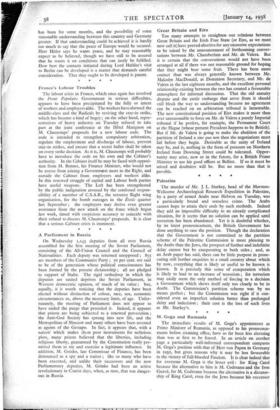A Parliament in Russia On Wednesday 1,143 deputies from all
over Russia assembled for the first meeting of the Soviet Parliament, consisting of the All-Union Council and the Council of Nationalities. Each deputy was returned unopposed ; 855 are members of the Communist Party ; 5o per cent. are said to be of the generation whose political consciousness has been formed by the present dictatorship ; all are pledged to support of Stalin. The rigid orthodoxy in which the deputies are united deprives the Soviet Parliament, in Western democratic opinion, of much of its value ; but, equally, it is worth noticing that the deputies have been elected without distinction of colour, race, sex, economic circumstances or, above the necessary limit, of age. Unfor- tunately, the meeting of Parliament does not appear to have ended the purge that preceded it. Indeed, it appears that priests are being subjected to a renewed persecution ; the Anti-God Society has sprung into new life, and the Metropolitan of Moscow and many others have been arrested as agents of the Gestapo. In fact, it appears that, with a naiveté which makes them poor instruments for nefarious plots, many priests believed that the liberties, including religious liberty, guaranteed by the Constitution really per- mitted them to try and exercise a legitimate influence. In addition, M. Grinko, late Conunissar of Finance, has been denounced as a spy and a traitor ; like so many who have been executed, and unlike their successors and the new Parliamentary deputies, M. Grinko had been an active revolutionary in Czarist days, when, as now, that was danger- ous in Russia.






































 Previous page
Previous page